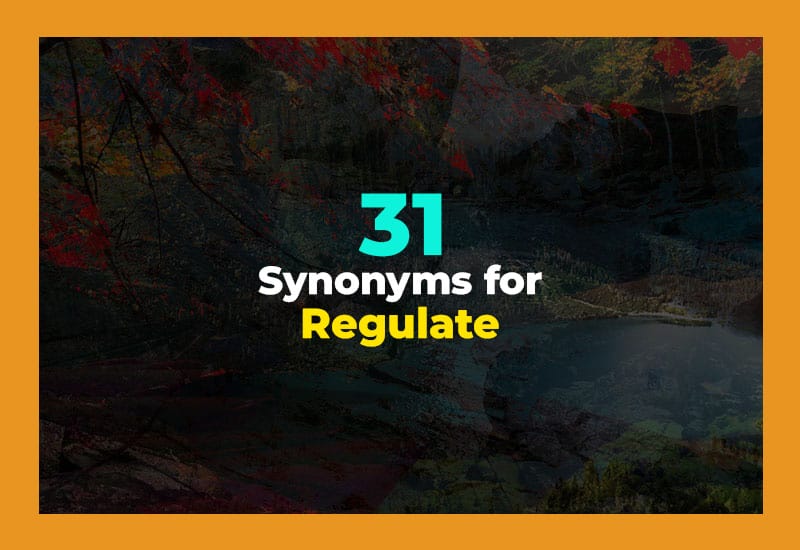Ever feel stuck using the same word over and over? Like “regulate”? Don't worry, I've got you! Let's explore 31 awesome synonyms for regulate. Words like control, manage, or adjust can spice up your writing. Ready to make your sentences pop? Let's dive in and have some fun!
Control or Manage
Control
Control means to have power over something to make it work the way you want. It's like being the boss of a situation. When you control something, you decide how it happens. For example, a teacher controls a classroom to keep it calm. This word is strong and shows authority. It's perfect when you want to sound firm. You can use it for people, machines, or even emotions.
- She controls the TV remote to pick her favorite show.
- The manager controls the project to meet deadlines.
- He controls his anger to stay calm.
Manage
Manage is about handling something carefully to keep it running smoothly. It's like organizing a busy day. You make sure everything stays on track. For example, a coach manages a team to win games. This word feels softer than control but still shows you're in charge. It's great for everyday situations.
- She manages her time to finish homework early.
- He manages the store to keep customers happy.
- They manage the event to make it fun.
Direct
Direct means guiding something toward a goal. It's like pointing a car in the right direction. You show the way and keep things moving. For example, a director directs a movie to tell a story. This word feels active and focused. Use it when someone is leading with purpose.
- She directs the choir to sing in harmony.
- He directs traffic to avoid accidents.
- They direct the meeting to stay on topic.
Govern
Govern means to make rules and guide actions, often in a big way. It's like a government leading a country. You set boundaries and make decisions. For example, a mayor governs a city to keep it safe. This word feels official and serious. It's great for formal situations.
- The council governs the town to improve roads.
- She governs her classroom with clear rules.
- He governs the club to plan events.
Supervise
Supervise means watching over something to make sure it's done right. It's like a lifeguard watching swimmers. You check on progress and help if needed. For example, a boss supervises workers to meet goals. This word feels supportive but still in charge. Use it for teamwork settings.
- She supervises the kids to keep them safe.
- He supervises the project to avoid mistakes.
- They supervise volunteers to help the event.
Oversee
Oversee is similar to supervise but feels a bit bigger. It means watching over a whole process or group. You make sure everything goes well. For example, a manager oversees a factory to produce goods. This word is great for large projects or teams. It shows leadership.
- She oversees the construction to finish on time.
- He oversees the team to meet sales goals.
- They oversee the festival to make it fun.
Administer
Administer means organizing and carrying out tasks to keep things running. It's like a nurse giving medicine. You make sure the job gets done properly. For example, a principal administers a school to help students learn. This word feels formal and practical. Use it for official duties.
- She administers the test to check student skills.
- He administers the program to help families.
- They administer funds to support charities.
Guide
Guide means showing the way gently. It's like helping a friend find a new place. You lead without being bossy. For example, a teacher guides students to understand math. This word feels kind and helpful. It's perfect for teaching or mentoring moments.
- She guides tourists through the city.
- He guides his brother to ride a bike.
- They guide the group to finish the task.
Steer
Steer means directing something carefully, like driving a boat. You nudge it in the right direction. It's great for situations needing gentle control. For example, a leader steers a team to success. This word feels smooth and calm. Use it when you want to sound subtle.
- She steers the conversation to avoid arguments.
- He steers the company to make profits.
- They steer the car to avoid traffic.
Handle
Handle means dealing with something directly. It's like fixing a problem yourself. You take charge and sort things out. For example, a chef handles kitchen tasks to serve food. This word feels practical and hands-on. It's great for everyday challenges.
- She handles customer complaints with a smile.
- He handles the dog to keep it calm.
- They handle the budget to save money.
Adjust or Fine-Tune
Adjust
Adjust means making small changes to improve something. It's like tweaking a radio to get clear sound. You fix things to work better. For example, you adjust a chair to sit comfortably. This word is simple and practical. Use it for small fixes.
- She adjusts the recipe to make it tastier.
- He adjusts his glasses to see clearly.
- They adjust the plan to meet new goals.
Fine-Tune
Fine-tune means making tiny, precise changes. It's like tuning a guitar perfectly. You focus on small details to get the best result. For example, a coach fine-tunes a player's skills. This word feels careful and detailed. It's great for perfectionists.
- She fine-tunes her speech to sound confident.
- He fine-tunes the engine to run smoothly.
- They fine-tune the design to look amazing.
Modulate
Modulate means adjusting something to keep it steady, like controlling your voice volume. It's about balance. For example, a singer modulates their voice to sound pleasant. This word feels technical but clear. Use it for smooth adjustments in specific settings.
- She modulates her tone to sound friendly.
- He modulates the heat to cook perfectly.
- They modulate the music to match the mood.
Calibrate
Calibrate means setting something exactly right, often with tools. It's like adjusting a scale to weigh accurately. You make precise tweaks. For example, scientists calibrate machines for experiments. This word feels scientific and exact. Use it for technical tasks.
- She calibrates the thermometer to measure correctly.
- He calibrates the camera to take clear photos.
- They calibrate the system to work efficiently.
Balance
Balance means keeping things even or stable. It's like weighing both sides of a scale. You make sure nothing tips over. For example, a chef balances flavors in a dish. This word feels calm and fair. Use it for harmony or fairness.
- She balances her work and family time.
- He balances the budget to avoid debt.
- They balance the team to share tasks.
Standardize
Standardize means making things follow the same rules or pattern. It's like setting a recipe for everyone to use. You create consistency. For example, a company standardizes products for quality. This word feels organized and official. Use it for systems or processes.
- She standardizes the forms to save time.
- He standardizes the tests for fairness.
- They standardize the process to avoid errors.
Normalize
Normalize means making something regular or normal. It's like calming a chaotic situation. You bring things back to a standard state. For example, a teacher normalizes classroom behavior. This word feels soothing and steady. Use it for calming or fixing situations.
- She normalizes her sleep to feel better.
- He normalizes the data for clear results.
- They normalize the room temperature for comfort.
Tune
Tune means adjusting something to make it work perfectly, like tuning a piano. You make small changes for the best outcome. For example, a mechanic tunes a car engine. This word feels musical and precise. Use it for careful improvements.
- She tunes her guitar before the show.
- He tunes the radio to find a station.
- They tune the machine to run faster.
Align
Align means lining things up to work together. It's like straightening books on a shelf. You make sure everything fits. For example, a manager aligns team goals with company plans. This word feels neat and cooperative. Use it for teamwork or organization.
- She aligns her schedule with her friends.
- He aligns the wheels for a smooth ride.
- They align their ideas to finish the project.
Correct
Correct means fixing mistakes to make something right. It's like editing a typo in a letter. You adjust to improve accuracy. For example, a teacher corrects homework. This word feels straightforward and helpful. Use it for fixing errors.
- She corrects her essay to get a better grade.
- He corrects his posture to avoid pain.
- They correct the map to show the right path.
Restrict or Limit
Restrict
Restrict means setting limits to control something. It's like putting a fence around a yard. You stop things from going too far. For example, a parent restricts screen time. This word feels firm and clear. Use it when you want to show boundaries.
- She restricts sugar to stay healthy.
- He restricts access to keep data safe.
- They restrict noise to help people focus.
Limit
Limit means putting a cap on something. It's like saying, "Only this much!" You keep things within bounds. For example, a budget limits spending. This word is simple and direct. Use it for clear restrictions.
- She limits her coffee to one cup daily.
- He limits the team to five members.
- They limit the event to 100 guests.
Constrain
Constrain means holding something back with rules or limits. It's like tying a balloon so it doesn't float away. You keep it in check. For example, laws constrain bad behavior. This word feels a bit formal. Use it for strict boundaries.
- She constrains her spending to save money.
- He constrains the dog with a leash.
- They constrain the project to meet deadlines.
Restrain
Restrain means holding back something or someone. It's like stopping a friend from arguing. You keep things calm or controlled. For example, police restrain crowds for safety. This word feels strong and serious. Use it for physical or emotional control.
- She restrains her excitement to stay calm.
- He restrains the horse to keep it safe.
- They restrain spending to avoid debt.
Curb
Curb means keeping something under control, often bad habits. It's like stopping yourself from eating too many snacks. You hold back gently. For example, a city curbs pollution with rules. This word feels casual but firm. Use it for controlling excess.
- She curbs her anger to stay polite.
- He curbs his spending to save cash.
- They curb noise to keep the neighborhood quiet.
Check
Check means stopping or slowing something down. It's like pausing a game to think. You control the pace or action. For example, a manager checks errors in work. This word feels quick and simple. Use it for brief interventions.
- She checks her speed to drive safely.
- He checks his answers to avoid mistakes.
- They check the kids to keep them quiet.
Organize or Systematize
Organize
Organize means putting things in order to work better. It's like tidying a messy room. You make everything neat and clear. For example, a librarian organizes books. This word feels practical and helpful. Use it for creating order.
- She organizes her desk to find things easily.
- He organizes the party to make it fun.
- They organize files to save time.
Order
Order means arranging things in a specific way. It's like sorting clothes by color. You create a clear system. For example, a chef orders ingredients for cooking. This word feels simple and neat. Use it for clear arrangements.
- She orders her notes to study better.
- He orders the tools to work faster.
- They order the seats for the event.
Systematize
Systematize means creating a clear system for tasks. It's like making a checklist for chores. You make things predictable and organized. For example, a company systematizes work to save time. This word feels technical but clear. Use it for structured processes.
- She systematizes her schedule to stay productive.
- He systematizes the warehouse for efficiency.
- They systematize data to avoid confusion.
Coordinate
Coordinate means making things work together smoothly. It's like planning a group trip. You align everyone's efforts. For example, a manager coordinates a team project. This word feels cooperative and active. Use it for teamwork or planning.
- She coordinates the event to run perfectly.
- He coordinates volunteers to help quickly.
- They coordinate schedules to meet up.
Structure
Structure means building a clear framework for something. It's like designing a house's layout. You create a solid plan. For example, a teacher structures lessons for learning. This word feels organized and strong. Use it for planning or systems.
- She structures her day to stay productive.
- He structures the team to work better.
- They structure the project to meet goals.
Final Thoughts
Wow, we've explored 31 synonyms for regulate! Each word adds a unique flavor to your writing. Whether you're controlling a project, adjusting a plan, or organizing tasks, there's a perfect word for every moment. Try them out to make your sentences shine. Keep practicing, and you'll sound like a pro in no time. Which synonym is your favorite? Let's keep the conversation going!

| Synonym | Meaning | Example |
|---|---|---|
| Control | Have power over something | She controls the game to win. |
| Manage | Handle something carefully | He manages his time to finish tasks. |
| Direct | Guide toward a goal | She directs the play to entertain. |
| Govern | Make rules to guide actions | He governs the city to keep it safe. |
| Supervise | Watch over to ensure correctness | She supervises the team to meet goals. |
| Oversee | Watch over a process or group | He oversees the factory to produce goods. |
| Administer | Organize and carry out tasks | She administers the test fairly. |
| Guide | Show the way gently | He guides the kids to learn new skills. |
| Steer | Direct carefully | She steers the boat to avoid rocks. |
| Handle | Deal with something directly | He handles problems with ease. |
| Adjust | Make small changes to improve | She adjusts the volume to hear better. |
| Fine-Tune | Make precise changes | He fine-tunes the car for speed. |
| Modulate | Adjust to keep steady | She modulates her voice to sound clear. |
| Calibrate | Set exactly right with tools | He calibrates the scale for accuracy. |
| Balance | Keep things even or stable | She balances her diet to stay healthy. |
| Standardize | Make things follow the same rules | He standardizes the process for quality. |
| Normalize | Make something regular or normal | She normalizes her routine for calm. |
| Tune | Adjust for perfect performance | He tunes the piano before the concert. |
| Align | Line things up to work together | She aligns her goals with the team's. |
| Correct | Fix mistakes to make right | He corrects his work to avoid errors. |
| Restrict | Set limits to control | She restricts phone use during class. |
| Limit | Put a cap on something | He limits spending to save money. |
| Constrain | Hold back with rules | She constrains her time to focus better. |
| Restrain | Hold back something or someone | He restrains his dog during walks. |
| Curb | Keep bad habits under control | She curbs her snacking to stay fit. |
| Check | Stop or slow something down | He checks his speed to drive safely. |
| Organize | Put things in order | She organizes her closet to find clothes. |
| Order | Arrange in a specific way | He orders books by author's name. |
| Systematize | Create a clear system | She systematizes her work to save time. |
| Coordinate | Make things work together | He coordinates the team for success. |
| Structure | Build a clear framework | She structures her day to stay on track. |









